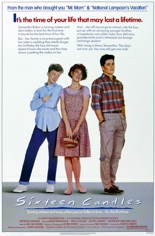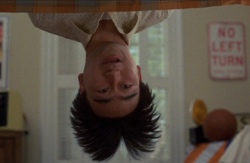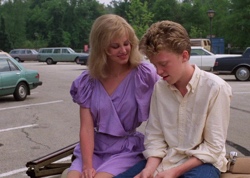
 I hadn’t seen John Hughes’ Sixteen Candles in about 16 years. With changes to the culture happening so fast these days, I’d recently been wondering how this teen film has held up, especially with many accusations of Asian-based racism, possible date rape and so on.
I hadn’t seen John Hughes’ Sixteen Candles in about 16 years. With changes to the culture happening so fast these days, I’d recently been wondering how this teen film has held up, especially with many accusations of Asian-based racism, possible date rape and so on.
The answer is “not great.”
I’m pretty sure we’re all familiar with the setup by now: Samantha’s (Molly Ringwald) family forgets her “fucking birthday” on the account of her sister’s upcoming nuptials, which sets into motion a series of event that includes giving her panties to a geek (Anthony Michael Hall) at a high school dance while, eventually, ending up with the quintessential hunk (Michael Schoeffling) of her dreams.
 While the film is still riotously hilarious, some of these laughs come with pangs of guilt. One of the most troubling is foreign exchange student Long Duk Dong (Gedde Watanabe); while Dong has many of the film’s most memorable lines, his stereotyped character seems more like a one-note joke from one of Hughes’ equally troublesome National Lampoon pieces.
While the film is still riotously hilarious, some of these laughs come with pangs of guilt. One of the most troubling is foreign exchange student Long Duk Dong (Gedde Watanabe); while Dong has many of the film’s most memorable lines, his stereotyped character seems more like a one-note joke from one of Hughes’ equally troublesome National Lampoon pieces.
And while Samantha is a realistically relatable character at a time when some of the worst-written ones were often female, her dream guy — even more than ever — comes off more like the Patrick Bateman of date rapists. At one point, he brags how he could “violate” his drunk girlfriend “10 different ways” if he wanted to, and then gives the passed-out prom queen to the geek Farmer Ted, ostensibly to drive home.
 Like her when she awakens, we’re not sure if anything happened between her and Ted, but she ultimately forgives him with a chance at a wholly unrealistic relationship. When I was a geeky youth myself, I thought it was the perfect situation; now I’m not so sure. He may be forgiven in and by the film, but it’s kind of hard for the audience, at least by today’s standards, to do the same.
Like her when she awakens, we’re not sure if anything happened between her and Ted, but she ultimately forgives him with a chance at a wholly unrealistic relationship. When I was a geeky youth myself, I thought it was the perfect situation; now I’m not so sure. He may be forgiven in and by the film, but it’s kind of hard for the audience, at least by today’s standards, to do the same.
I guess we can play it off with the trite “it was the ’80s” cliché, a different time with strangely lax mores when compared to today. Watched through that retrofitted eye, Sixteen Candles does stand up as one of the most memorable comedies of the time, but ultimately one you couldn’t get away with today and, honestly, why would you want to? —Louis Fowler
